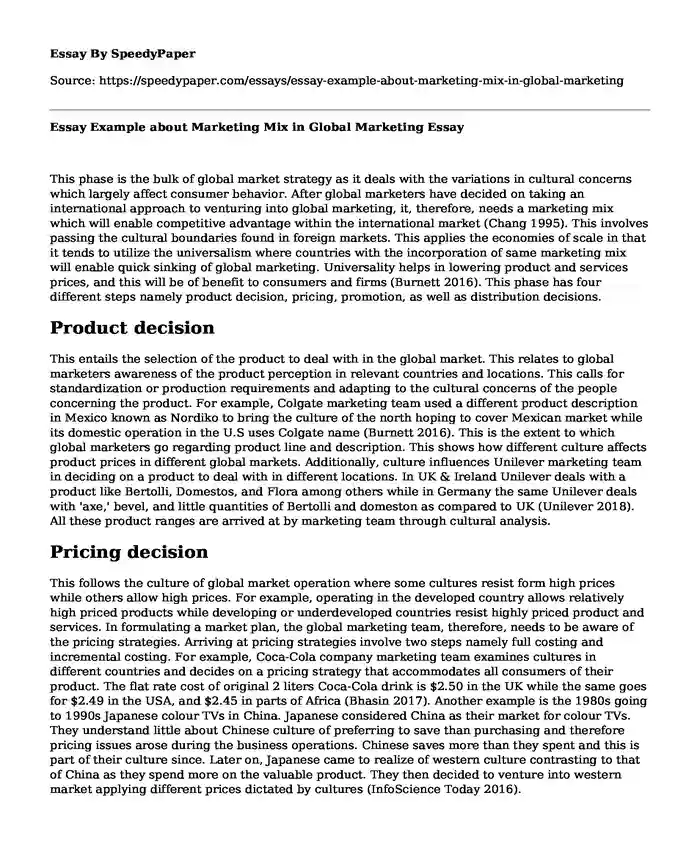This phase is the bulk of global market strategy as it deals with the variations in cultural concerns which largely affect consumer behavior. After global marketers have decided on taking an international approach to venturing into global marketing, it, therefore, needs a marketing mix which will enable competitive advantage within the international market (Chang 1995). This involves passing the cultural boundaries found in foreign markets. This applies the economies of scale in that it tends to utilize the universalism where countries with the incorporation of same marketing mix will enable quick sinking of global marketing. Universality helps in lowering product and services prices, and this will be of benefit to consumers and firms (Burnett 2016). This phase has four different steps namely product decision, pricing, promotion, as well as distribution decisions.
Product decision
This entails the selection of the product to deal with in the global market. This relates to global marketers awareness of the product perception in relevant countries and locations. This calls for standardization or production requirements and adapting to the cultural concerns of the people concerning the product. For example, Colgate marketing team used a different product description in Mexico known as Nordiko to bring the culture of the north hoping to cover Mexican market while its domestic operation in the U.S uses Colgate name (Burnett 2016). This is the extent to which global marketers go regarding product line and description. This shows how different culture affects product prices in different global markets. Additionally, culture influences Unilever marketing team in deciding on a product to deal with in different locations. In UK & Ireland Unilever deals with a product like Bertolli, Domestos, and Flora among others while in Germany the same Unilever deals with 'axe,' bevel, and little quantities of Bertolli and domeston as compared to UK (Unilever 2018). All these product ranges are arrived at by marketing team through cultural analysis.
Pricing decision
This follows the culture of global market operation where some cultures resist form high prices while others allow high prices. For example, operating in the developed country allows relatively high priced products while developing or underdeveloped countries resist highly priced product and services. In formulating a market plan, the global marketing team, therefore, needs to be aware of the pricing strategies. Arriving at pricing strategies involve two steps namely full costing and incremental costing. For example, Coca-Cola company marketing team examines cultures in different countries and decides on a pricing strategy that accommodates all consumers of their product. The flat rate cost of original 2 liters Coca-Cola drink is $2.50 in the UK while the same goes for $2.49 in the USA, and $2.45 in parts of Africa (Bhasin 2017). Another example is the 1980s going to 1990s Japanese colour TVs in China. Japanese considered China as their market for colour TVs. They understand little about Chinese culture of preferring to save than purchasing and therefore pricing issues arose during the business operations. Chinese saves more than they spent and this is part of their culture since. Later on, Japanese came to realize of western culture contrasting to that of China as they spend more on the valuable product. They then decided to venture into western market applying different prices dictated by cultures (InfoScience Today 2016).
Promotion decision
Promotion is one of the fundamental in product awareness creation to establish a large market coverage. Many global businesses consider this an important step in competitive advantage thereby increasing its operation (Wernick n.d.). Promotion forces global marketers to alter names depending on the cultural location. For example, Chevy used a different promotional name of 'Nova' in Latin America to capture the Latin American market. The same goes for Esso changing its promotional name to P&G. This shows the extent to which global marketers have to go concerning promotion (Burnett 2016). An example of the promotional strategy of Barclays Bank which involves sponsorship of football programmes in the UK (English Premier League between 2001-2016) and its environs while focusing on sales promotion strategies in developing countries like African countries. The Barclays Bank marketing strategies considered football culture in England and ventured into it while tried to help African developing countries through sales promotion (Zigu 2017).
Product distribution
This entails operations such as storage, inventory management, transportation, order processing, customer servicing, as well as packaging among others. To formulate and plan a global marketing strategy, there's need for a distribution strategy which will enhance delivery of product and services to the market (Burnett 2016). Selecting the applicable channel of distribution is as important as any other step in formulating a market plan from manufacturers all the way to consumers with well-defined intermediaries (wholesalers, distribution agents, and retailer...
Cite this page
Essay Example about Marketing Mix in Global Marketing. (2022, May 04). Retrieved from https://speedypaper.com/essays/essay-example-about-marketing-mix-in-global-marketing
Request Removal
If you are the original author of this essay and no longer wish to have it published on the SpeedyPaper website, please click below to request its removal:
- Free Essay Sample on Race and Racism
- Free Essay on College Credit
- Free Essay About History of Deforestation
- Essay Example on Multiple Representations in Teaching
- Free Essay: The Effects of Family, Community and Society on Human Behavior and Personality
- Essay Sample: Planning and Clean Water Shortage Problems Facing Makoko
- Essay Example. Competitive Business-Level Strategies
Popular categories





